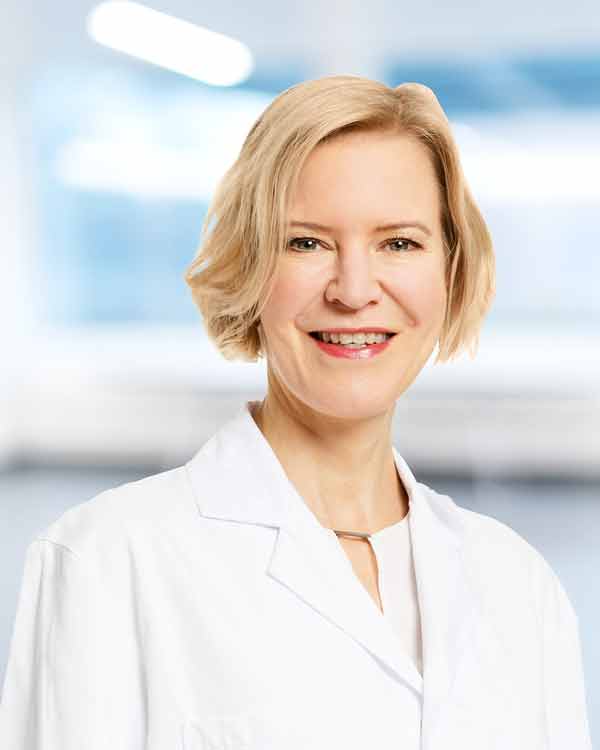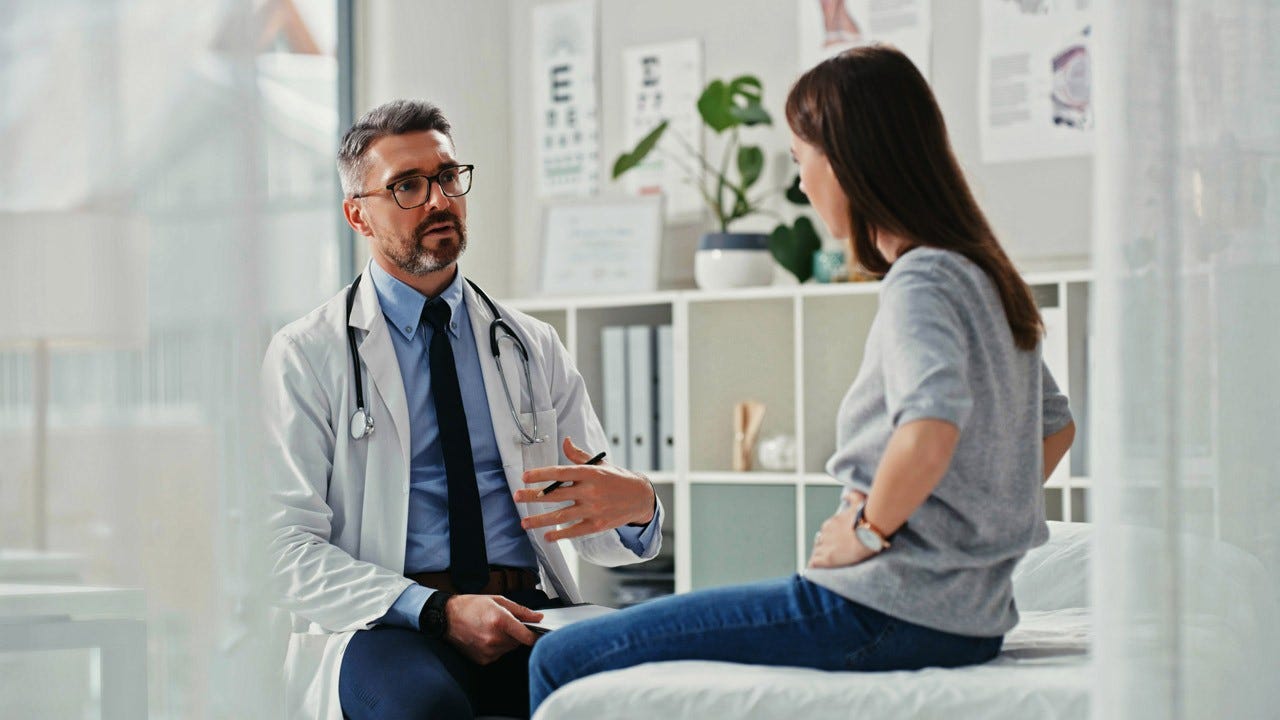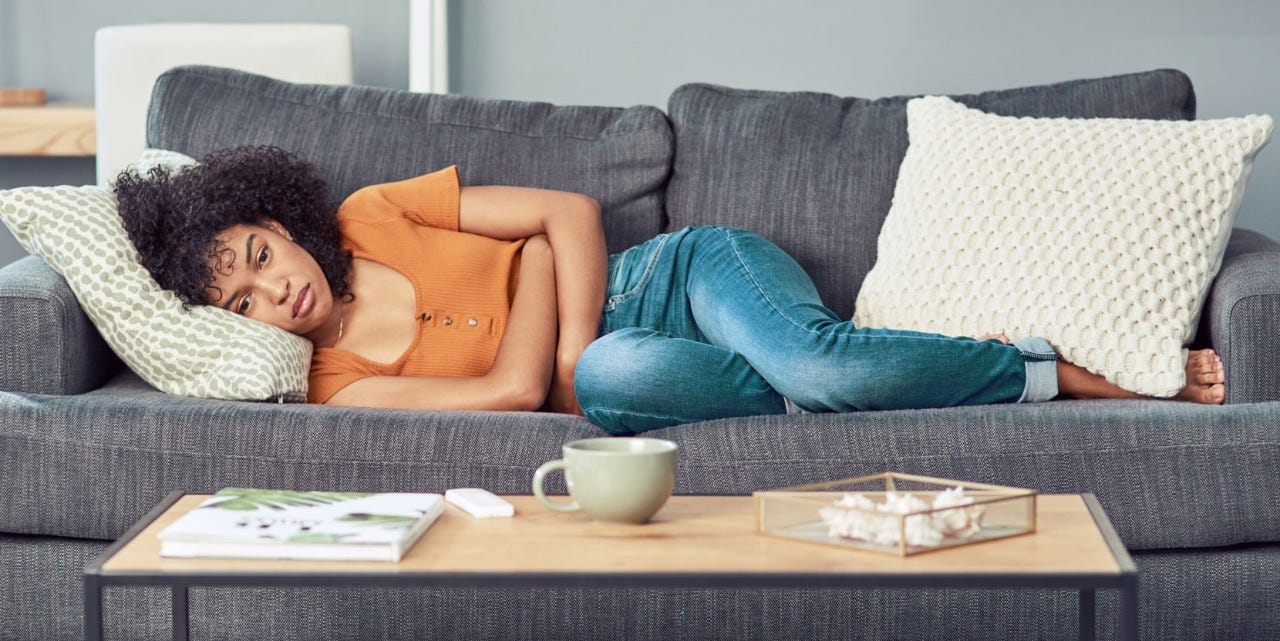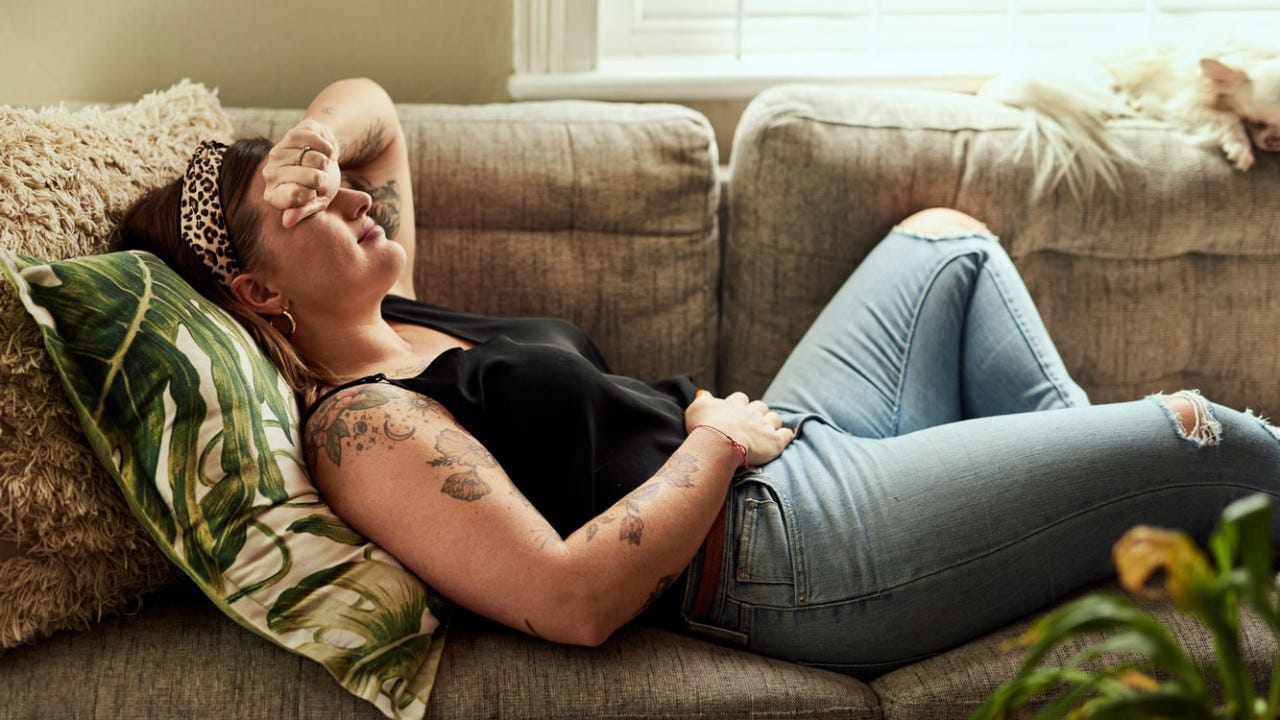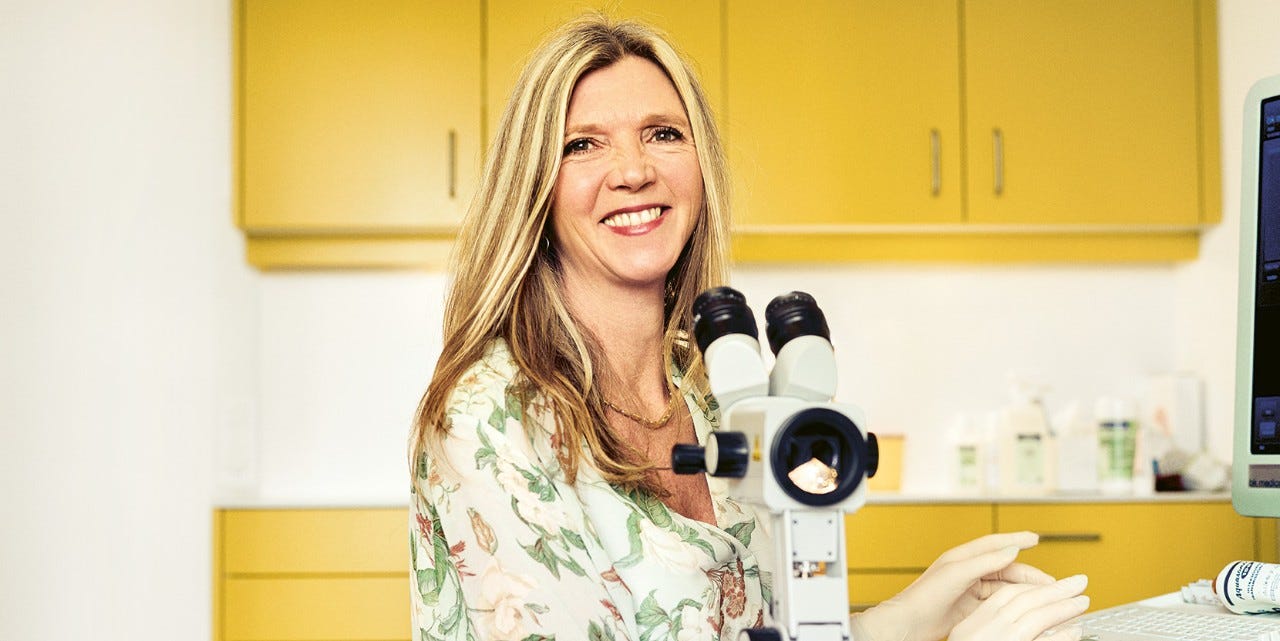Menopause: symptoms & treatment
Menopause is a natural transition that involves a wide array of symptoms. The seriousness of the changes depends on biology, lifestyle and stress levels.

Key points at a glance
- Menopause includes four phases and usually starts between the ages of 45 and 55.
- Typical symptoms include hot flushes, sleep disorders and vaginal dryness.
- The risk of abdominal fat and cardiovascular diseases also increases at this time.
- Sexuality can change, presenting as low sexual desire for example.
- Individually dosed hormone replacement therapy and home remedies can alleviate symptoms.
Menopause marks a profound turning point in the lives of many women – both physically and emotionally. Nevertheless, this phase of life is rarely discussed openly. Many of those affected experience changes that can have a significant impact on their everyday lives.
Four phases of menopause
It starts with minor irritations, such as isolated nights of poor sleep, days when your mood changes more quickly than you’re used to, or headaches that occur out of the blue. Somewhere in the back of your mind, you might think it’s something to do with menopause,
but the thought is quickly dismissed with: “I’m far too young for that.” This is precisely where one of the biggest misunderstandings lies. Menopause is a lengthy process that often begins much earlier than we would like to admit.
-
Premenopause
During premenopause, the body slowly begins to reduce hormone production. This phase can start as early as age 30 and lasts on average around seven years. Progesterone levels fall particularly sharply during this time, often going hand in hand with the first changes in the woman’s cycle.
Symptoms during premenopause
- Mood swings and stronger PMS
- Sleep disorders and fatigue
- Hot flushes
- Headaches
- Changes in the breast: tenderness, sagging, cysts
Because symptoms can already occur in this early phase, treatment with hormone replacement products is often recommended during premenopause. Whether this is appropriate depends on the individual symptoms.
-
Perimenopause
In early perimenopause, hormones become unbalanced for the first time: progesterone levels fall while oestrogen remains high. At this stage, many women experience fluctuations in their cycle, heavier periods or more pronounced PMS. Often the first clear signs of menopause set in.
Symptoms during perimenopause
- Longer or shorter cycles
- Heavier or lighter periods
- Hot flushes and sweating at night
- Migraines
- Feeling down
- Brain fog: difficulties concentrating, problems recalling words or the feeling of being mentally absent.
-
Menopause
Menopause marks the final menstrual period. This milestone is only noted retrospectively, because menopause is only considered “official” when you’ve not had a period for 12 months. Before that, your periods may suddenly resume after months without bleeding.
Many people think they have already gone through menopause and then unexpectedly experience further periods. A full year without a period provides clarity and marks the final transition.
On average, menopause occurs at around 52 years of age.
-
Postmenopause
Postmenopause begins after the final menstrual period. The body still needs a few years to adjust entirely to the new, permanently lower, hormonal balance. From that point on, this “phase” lasts for the rest of a woman’s life – often a third of a person’s total lifespan.
Many symptoms experienced in the transition period subside noticeably during postmenopause. Mood swings, breast pain or severe cycle changes are then usually a thing of the past because the hormones no longer fluctuate constantly but remain at a stable level.
For many women, this phase also brings new freedoms: no more periods, no more worries about pregnancy, less physical restlessness. Postmenopause is therefore often calmer, clearer and less stressful than the years before.
At what age does menopause start?
Most women reach menopause between the ages of 45 and 55. During this period, the ovaries gradually cease to function and the oestrogen level in the blood drops significantly. This hormonal decline is the biological cause of menopause.
Some women go through menopause earlier, for example after surgery or certain medical treatments. In this case, the transition doesn’t occur naturally, but is caused by external factors.
“When oestrogen levels drop, this can really affect your mood.”
Frequent symptoms of menopause
Menopause isn’t an illness − it’s the body’s natural response to hormonal changes. Symptoms vary greatly from person to person and depend on the phase of the transition.
-
Hot flushes and sweating
Around one in two women experiences hot flushes – sudden sensations of heat spreading across the upper body, frequently accompanied by sweating, palpitations or shivering.
They are considered the only symptom that can be clearly attributed to hormonal changes. The extent to which they occur varies greatly from person to person.
-
Palpitations and dizziness
For some women, hot flushes cause severe palpitations or dizziness. If these symptoms only occur together with the flushes, they are usually considered harmless.
If palpitations occur independently of this, medical advice should be sought.
-
Mood swings
Hormones influence our emotional state. “Oestrogen modulates neurotransmitter systems such as serotonin and dopamine, which play a central role in regulating our moods. When oestrogen levels drop, this can really affect your mood,” explains Professor Stute.
At the same time, partnerships, families or professional situations often change in this phase of life, which can increase irritability, sadness or worry. It is also important to note that not all depression in this phase of life is due to hormones.
“Psychological support should be sought if depressive moods last longer than two weeks, severely affect everyday life or lead to social withdrawal. Even if purely hormonal therapy is not enough, combining it with psychological support is often the most successful approach,” advises Professor Stute.
-
Sleep disruption
Sleep problems are usually caused indirectly by hot flushes or night sweats. Heart palpitations, bladder weakness or worrying about getting older can also disrupt sleep.
Sleep disorders tend to become more common in old age anyway.
-
Bladder weakness
Incontinence or an irritable bladder are rarely directly related to hormones. However, the lack of oestrogen causes mucous membranes to become thinner and more susceptible to infections; the pelvic floor and connective tissue also lose firmness. This can promote the urge to urinate or exacerbate urine leakage.
-
Vaginal dryness
Decreasing oestrogen makes the mucous membranes in the genital area thinner, drier and more sensitive. This can cause itching, burning or pain – also during sex. As a result, many women experience significant restrictions in everyday life for the first time.
-
Weight gain
With increasing age, energy expenditure decreases and the body stores fat, particularly on the stomach, waist and chest. Moderate weight gain can even alleviate symptoms, as adipose tissue produces oestrogen.
However, obesity increases the risk of diabetes, high blood pressure and cardiovascular disease.
-
Skin and hair
Many women notice that their skin becomes drier and less firm. This is partly due to the decline in oestrogen and partly to the general ageing process.
Changes in hormone levels can also cause hair to become thinner in certain areas or to grow more strongly, for example on the face.
Video: Menopause simply explained
Menopause affects weight
Menopause is considered a risk window for weight gain, with declining hormones affecting appetite, activity and fat distribution. At the same time, muscle mass decreases with age, the basal metabolic rate drops and so does the energy requirement.
Researchers from New Zealand have shown that the primary change is in body composition: less muscle mass, more fat mass and a significant increase in abdominal fat. This fat distribution increases the risk of cardiovascular and metabolic diseases, even if the weight increases only moderately.
A five-year study of 535 women showed that weight gain and a growing waist circumference can be prevented if women consistently integrate more exercise and a fat-modified, balanced diet into their daily lives.
Specialist Petra Stute confirms: “A multimodal approach is usually required: adjust the diet to include sufficient protein, legumes and wholegrain products, get regular exercise to maintain muscle mass and, if necessary, implement personalised hormone therapy.”
Exercises to prevent abdominal fat during menopause
During menopause, abdominal fat in particular increases, and this type of fat is the most risky in metabolic terms. Two things can help: endurance training to reduce fat and strength training to maintain muscle mass and the basal metabolic rate.
Adults are recommended to do 150 to 300 minutes of moderate exercise a week or 75 to 150 minutes of intensive activity, plus strength training on at least two days. Women who are overweight would benefit from more exercise to reduce their waist circumference in the long term.
You can find exercises for a stronger core in our workout video.
Sexuality during menopause
Sexuality also changes during menopause. Declining hormones can affect desire and arousal, but they don’t have to. Partnership, stress, body image and the personal experience of ageing also play a role. Some women feel restricted, while others experience this time as a new freedom.
-
Lower sex drive
When hormone production decreases, interest in sex can wane or orgasms can be less intense. “But this isn’t necessarily the case,” explains Professor Stute.
In fact, biological changes only explain part of the sexual changes in this phase of life. “Menopause isn’t automatically associated with a decline in sexual activity.” The following factors play an equally important role:
- Partnership
- Stress levels
- How you experience the process of ageing
- Lack of sleep
- Your own body image
- Mood swings
Some women report a new sense of freedom and more serenity in their love life after menopause.
“There are some excellent treatment options today,” says Stute. These include:
- Local oestrogen therapies in the form of creams, suppositories or vaginal rings
- Systemic hormone therapy for severe symptoms
“Studies also show that hormone replacement therapy has a positive impact on the mind, skin and balance, and this naturally also has an effect on sexuality,” says Professor Stute.
-
Vaginal dryness
Decreasing oestrogen makes the mucous membranes in the genital area thinner, drier and more sensitive. This can cause pain during sex, burning or itching, symptoms that women often experience as particularly disturbing.
“Fortunately, it’s very easy to treat,” says Stute. Locally applied hormone-containing creams or suppositories are usually effective. Hormone-free moisturisers and lubricants can also provide quick relief.
Studies show that, for many women, non-hormonal products are as effective as hormonal preparations. Regular use is key. If symptoms persist, a gynaecological examination should be carried out, as there are often simple solutions.
-
Contraception during menopause
Fertility decreases, but doesn’t stop abruptly. Pregnancy can also occur in the years before menopause, so couples should continue to use reliable methods of contraception until it is clear that menopause has been reached.
Suitable methods should be discussed with the gynaecologist. The pill partially alleviates symptoms, but contains artificial oestrogen and is associated with a higher risk of thrombosis, strokes and heart attacks than other hormone therapies.
Healthy women can continue to take their combined pill until around the age of 50. By that point at the latest, switching to a safer alternative is recommended.
It is also important to remember that if you’re not in a monogamous relationship you should continue to take precautions against sexually transmitted infections.
When to use hormone replacement therapy
The principle is simple: Hormone replacement therapy is intended to relieve severe menopausal symptoms, not to restore previous hormone levels. If used correctly, it can have real benefits. For example, it reduces the risk of osteoporosis, dementia, heart attacks, diabetes and bowel cancer.
“Numerous studies have shown how hormone replacement therapy reduces the risk of diabetes, fractures and bowel cancer, which has led to corresponding recommendations in international guidelines,” says Professor Stute.
When it comes to prescribing a hormone replacement preparation, it is important to accurately assess a patient’s risk profile. Unnecessary or incorrect hormone intake can have serious health consequences, including an increased risk of thrombosis, strokes, heart attacks and certain types of cancer,” adds Stute.
The Swiss Cancer League emphasises: HRT isn’t prescribed automatically – it is a decision that should be made on an individual basis. The earlier it is started and the lower the dose, the more favourable the risk-benefit ratio. Careful clarification and regular checks are essential.
What are the disadvantages of hormone replacement therapy?
Orally ingested oestrogens increase the risk of thrombosis and stroke, which is why experts prefer gels or patches that have a significantly lower impact on this risk.
When it comes to breast cancer, it’s worth taking a closer look at the studies: A large study conducted in the USA showed that the risk increases slightly with a multi-year combination of oestrogen and progesterone.
In absolute terms, however, this means only a few additional cases per 10,000 women per year. No increased risk was found with oestrogen monotherapy (only possible in women without a uterus).
The Swiss Cancer League sums it up pragmatically: Hormone replacement therapy is the most effective treatment for severe menopausal symptoms, but it isn’t a one-size-fits-all solution. It must be used in low doses for a limited time and checked regularly. And it only makes sense if the complaints really affect the patient’s quality of life.
“Excellent treatment options are available today.”
Home remedies for menopause symptoms
Whether you suffer from hot flushes, mood swings, poor sleep or a low sex drive, in addition to HRT, there are various home remedies that can help ease menopausal symptoms.
You can find an overview of all home remedies in our article "6 home remedies for menopausal symptoms".
Positive changes during menopause
Even if the body changes, this phase of life isn’t all doom and gloom. Yes, your body ages a little faster without the oestrogen, which is reflected in your skin, hair, blood vessels and bones. And many women experience their first wrinkles, stiffer joints and vague aches and pains. But the idea that it’s all downhill from here is too simplistic.
For many women, this hormonal change marks the beginning of a phase of reorientation. They use it as an opportunity to take a closer look at what does them good and what not. Relationships, routines and stresses are reassessed more critically, boundaries are drawn more clearly and needs are taken more seriously.
The emotional and social competence that women often achieve during these years isn’t a side effect, but a real benefit. “Menopause can also be seen as an opportunity. A time when women decide to take an active approach to their health,” says Professor Stute.
Some women experience menopause as a time of liberation – less sense of duty, greater self-determination, more courage. Loved ones may need time to adjust, but a woman who finally puts herself first can really feel the benefits of this process.
“Menopause is a natural phase of life, not an illness. But this doesn’t mean that women simply have to put up with the symptoms,” says Stute. Those who talk openly about the issues can now benefit from a wide range of treatment options. “Evidence-based, safe and individually adaptable treatment options are available today.”
